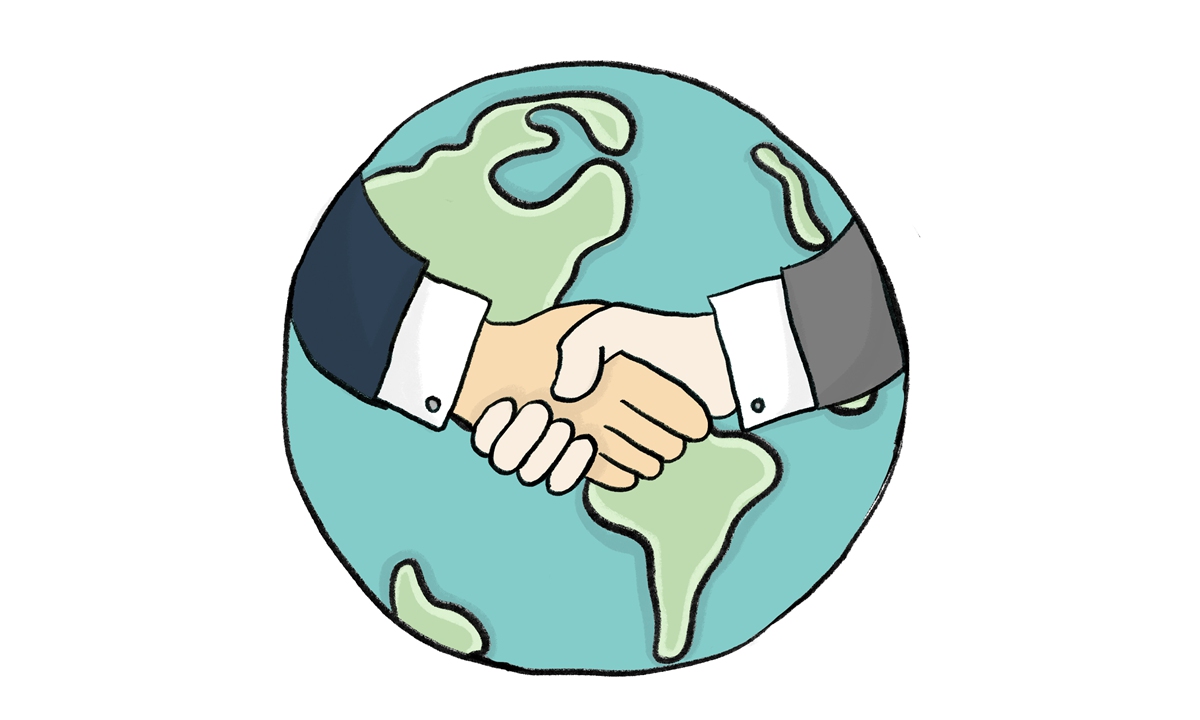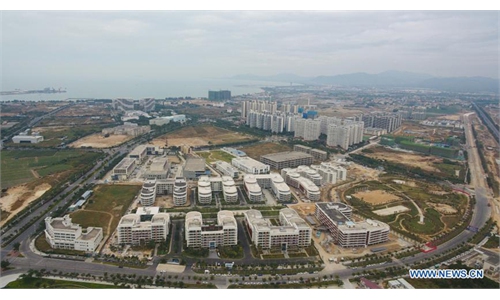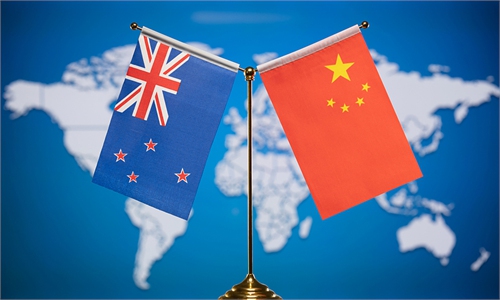COMMENTS / EXPERT ASSESSMENT
Beijing is firm in upholding free trade, combating protectionism

Illustration: Chen Xia/GT
China's 1.4 billion people are entering a buying spree as they prepare to celebrate the Spring Festival holiday, the most important celebration of the year for singing, dancing and feasting with family members and close friends. The usually joyful leisure time also offers a special window to look back at the past and choreograph a plan for the coming year.Despite the onset of novel coronavirus and the US government's sweeping punitive trade tariffs, China's economy has roared back to its pre-pandemic fast growth track, achieving an eye-popping 6.5 percent real GDP acceleration in the last quarter of 2020. Against a distressing backdrop, the country's yearly foreign trade volume demonstrated a positive growth in 2020 and landed the largest annual trade surplus in history.
Barring another natural catastrophe like the decimating virus, the $15.6 trillion economy is poised to gain approximately 8-8.5 percent in 2021 to near $17 trillion at the end of 2021, powered by increasingly affluent Chinese consumers, its giant and more confiscated machine of manufacturing, and a mushrooming of indigenous high-tech upstarts throughout the country.
The ballooning confidence is being inscribed in the hearts of billions of people who have witnessed the resolve and efficacy of China's leadership to scramble to tackle crises - the 2008 global financial crisis, Trump's trade war, Covid-19, the border skirmish with India, and the sudden economic slump in the first quarter of 2020 caused by a country-wide shut-down.
This kind of confidence, obtained through overcoming the flurry of difficulties, is as precious as gold, and is never to be looked down upon.
In dealing with the once-in-a-century pandemic, the Chinese political and social system's ability in organizing and orchestrating resources to organize and quarantine the infected and their close contacts, to build up new hospitals in less than two weeks, and rush medics from all over the country to help a central province, was playing out before the world. Following the decisive win in Wuhan and Hubei, the country never allowed subsequent intermittent resurgences in Xinjiang, Heilongjiang, Tianjin, Hebei, Beijing and Shanghai to form another epidemic.
Until today, many media outlets and politicians in the US and some Western nations are refusing to admit that the Chinese system's unique competitiveness has led to this country's great success in containing the coronavirus and helped the country avert tens of thousands of deaths and illnesses.
In the coming five years, China and its leadership should keep up their fighting spirit of staring squarely at any challenges before them, analyzing, resolving and conquering them, and try their utmost to live up to being classified as "the most serious competitor" by constantly building up national strength in all fields. Just a reminder that dozens of Chinese high-tech companies are still cut off crucial supplies by Trump's administrative orders, though the mad man is already dethroned.
This country could continue to make full use of its system's advantages. As always, it could create dynamic growth by using Chinese people's peculiar higher saving rates and investing heavily in advanced infrastructure projects - bridges, tunnels, subways, ports, clean power generators, urban transits, high-speed railways and expressways in particular.
At the same time, the country could continue to inspire state-run research labs and private enterprises - like Alibaba, Huawei and Tencent - to cultivate new technologies in electronic payment, high-end semiconductors, aerospace, new biological medicine, cloud computing, artificial intelligence, industrial robotics and new energy self-driving vehicles.
The ruling Communist Party of China (CPC) could continue to increase levies on the country's super-rich and upper middle class - through higher personal income tax, property levies and capital gains taxation - to set up a larger fiscal pool to ensure a decent livelihood for the poor and disadvantaged portion of the population. The central government has a special role to play to provide a sweeping safeguard umbrella of social insurances that cover all of the country's residents.
As this country continues to develop at an amazingly elevated pace that the world has rarely witnessed, it will continue to encourage the development and growth of its neighbors. In the past few years, in the form of surging trade, knowledge, capital and Chinese tourists across the borders, nearly all of China's neighbors have benefited.
For the purpose of accelerating common development and prosperity, China's government signed two benchmark trade and investment deals in 2020 - the 15-member RCEP encompassing all 10 ASEAN neighbors and China, Japan, South Korea, Australia and New Zealand, and the EU-China Comprehensive Agreement on Investment. With trade and investment barriers being removed, the two pacts are expected to create new wealth for the member countries.
Together with the iconic Belt and Road Initiative, the people living in less developed regions in Asia, Africa and Europe will see new infrastructure projects grow and numerous jobs will be created on their land, where they will feel the tangible spillover effect of China's booming economy.
Lately, in another display of Chinese leadership's multilateral foreign policy approach, Beijing said that it is favorably considering joining the 11-member Comprehensive and Progressive Agreement for Trans-Pacific Partnership led by Japan. It is well-known that market demand from China has given key support to global trade and Japan's export-reliant economy in recent years. Tokyo understands that economic interdependence is the ballast for their bilateral relations.
By enrolling China, South Korea, Britain and other major economies in the CPTPP, a considerably larger free trade zone will come into being, forming a solid safeguard against the hegemonic higher tariffs and wonton protectionism the world has seen in the past few years.
The author is an editor with the Global Times. bizopinion@globaltimes.com.cn



